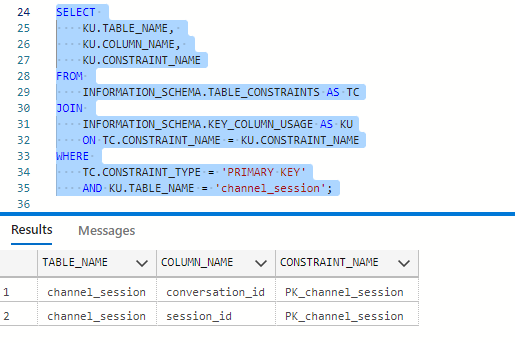⚠️ Prerequisites
-
CX Version - CX4.9.3
-
Ensure you have appropriate database access (e.g., db_owner or similar).
-
Make sure no ongoing inserts/updates are happening on
channel_sessionduring this operation to avoid conflicts. -
Ideally, take a backup or ensure the environment has point-in-time recovery enabled.
✅ 1. MYSQL: Step-by-Step Guide
🔹 Step 1: Drop and Add New Composite Primary Key
ALTER TABLE channel_session DROP PRIMARY KEY;
ALTER TABLE channel_session ADD PRIMARY KEY (conversation_id, session_id);
Script is also available at: kubernetes/pre-deployment/reportingConnector/dbScripts/dbupdate/historical_reports_db_update_script_MYSQL.sql.sql
🔹 Step 2: Verify
Check that the new primary key is on (conversation_id, session_id).
SHOW KEYS FROM channel_session WHERE Key_name = 'PRIMARY';

✅ 2. MSSQL (SQL Server): Step-by-Step Guide
🔹 Step 1: Find Existing Primary Key Constraint Name
Run:
SELECT name
FROM sys.key_constraints
WHERE type = 'PK' AND parent_object_id = OBJECT_ID('channel_session');
Note down the result (e.g., PK__channel__abc123).

Script is also available at : kubernetes/pre-deployment/reportingConnector/dbScripts/dbupdate/get_primary_key_name_channel_session.sql
🔹 Step 2: Drop the Primary Key
Replace with the actual name from Step 1:
ALTER TABLE channel_session DROP CONSTRAINT <replce with primary key name noted from step 1>;
🔹 Step 3: Add New Composite Primary Key
ALTER TABLE channel_session
ADD CONSTRAINT PK_channel_session
PRIMARY KEY CLUSTERED (conversation_id ASC, session_id ASC)
WITH (
PAD_INDEX = OFF,
STATISTICS_NORECOMPUTE = OFF,
IGNORE_DUP_KEY = OFF,
ALLOW_ROW_LOCKS = ON,
ALLOW_PAGE_LOCKS = ON,
OPTIMIZE_FOR_SEQUENTIAL_KEY = OFF
) ON [PRIMARY];
Script is also available at : kubernetes/pre-deployment/reportingConnector/dbScripts/dbupdate/historical_reports_db_update_script_MSSQL.sql.sql
🔹 Step 4: Verify
Check that the new primary key is on (conversation_id, session_id).
SELECT
KU.TABLE_NAME,
KU.COLUMN_NAME,
KU.CONSTRAINT_NAME
FROM
INFORMATION_SCHEMA.TABLE_CONSTRAINTS AS TC
JOIN
INFORMATION_SCHEMA.KEY_COLUMN_USAGE AS KU
ON TC.CONSTRAINT_NAME = KU.CONSTRAINT_NAME
WHERE
TC.CONSTRAINT_TYPE = 'PRIMARY KEY'
AND KU.TABLE_NAME = 'channel_session';
